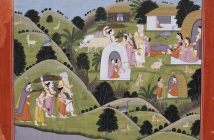I have tried to gather a set of facts and have presented them in a certain order. There are a few comments here and there in between. My basic aim through this note is to show case how Absolute Freedom of Expression is a very Dharmic idea and why we should cherish it and try to preserve it.
The concluding hymn of the Rig Veda 10.192 says something like “Samgacchadhvam, samvadadhvam,sam vo manamsi janatam”, it means “Meet together, talk together, and may your mind apprehend the Truth alike.” The ancient rishi from this verse of the Rig Veda is calling for people to come together and exchange views freely and harmoniously.
In another hymn of Rig Veda 10.121 the rishi says ” sa dādhāra pṛthivīṃ dyāmutemāṃ kasmai devāyahaviṣā vidhema ||” i.e He fixed and holdeth up this earth and heaven. What deva shall we adore with our oblation?
Notice the thought of the rishi here. He is basically questioning the deva which was a central theme of the vedic times. He is asking which deva do I offer oblation to. Imagine if something like this happened in today’s world. What would the reaction be on social media. What # will we outrage on.
The last week of May every year thousands of hill tribes converge at the famous Ayyappa Temple to mark Kunde Habba, a festival of abusing God, in Karnataka’s Devarapura area near Thithiamthi Village of Madikeri District’s Virajpet Taluk. Also known as “Bodu Habba” in Kodagu, the festival of abusing God is celebrated by tribal people of that area and it’s surrounding districts.
The story goes that once upon a time Lord Ayyappa had taken the tribals for hunting in the forest. But on the way Lord Ayyappa met Goddess Badrakali in the forest. Upon meeting her he abandoned the tribals and left the place with her. Fumed by the Lords behaviour the tribals felt ditched and since then have started observing that day as a festival to commemorate the incident by abusing the Lord. So the day would start with tribals dancing to the tunes of folk songs all through the day. At the end of the day all the tribals will assemble in the temple and seek apology from the Lord. Can you imagine that. Someone abusing God. Can you imagine a faith actually allowing that.
Yet another story was narrated by Salman Rushdie in one of his speeches which I saw on youtube. I will share his exact words ” But the Indian tradition also includes from its very earliest times, very powerful defences of free expression. When Deepa Mehta and I were working on the film of Midnight’s Children, one of the things that we often discussed was a text dear to our hearts, the Natya Shastra. In the Natya Shastra we see the Gods being a little bit bored in heaven and deciding they wanted entertainment. And so a play was made, about the war between Indra and the Asuras, telling how Indra used his mighty weapons to defeat the demons. When the play was performed for the Gods, the demons were offended by their portrayal. The demons felt that the work insulted them as demons. That demoness was improperly criticized. And they attacked the actors; whereupon Indra and Brahma came to the actors’ defence. Gods were positioned at all four corners of the stage, and Indra declared that the stage would be a space where everything could be said and nothing could be prohibited.
So in one of the most ancient of Indian texts we find as explicit and extreme a defence of freedom of expression as you can find anywhere in the world. This is not alien to India. This is our culture, our history and our tradition which we are in danger of forgetting and we would do well to remember it ”
Now let us read a few verses of Cārvāka the oldest atheistic school of thought known to mankind.
” While life is yours live joyously; No one can avoid Death’s searching eye: When this body of ours is burnt, How can it ever return again? ”
” If a beast slain as an offering to the dead will itself go to heaven, why does the sacrificer not straightway offer his father? ”
” The Sacrifices, the three Vedas, the ascetic’s three staves, and smearing oneself with ashes— Brhaspati says these are but means of livelihood, for those who have no manliness nor sense. ”
Think of the time when these words were uttered and ask yourself who is the more tolerant one. Imagine someone in today’s day and age abusing a God or questioning the intelligence of a sadhu who does a vedic yajna. Just ask yourself which era had freedom of expression and thought.
Our society has had a history and tradition where there have been different schools of thought in Jainism, Buddhism, Cārvāka etc., who had disagreed with the Vedas and inspite of that had peacefully coexisted with the different Vedic schools.
Intellectual freedom accompanied by the ideas of freedom of expression and thought were an integral part of our ancient vedic society.
A great example of that is the Jain philosphy of Anekāntavāda. This is one of the most important and fundamental doctrines of Jainism. It refers to the principles of pluralism and multiplicity of viewpoints, the notion that truth and reality are perceived differently from diverse points of view, and that no single point of view is the complete truth.
Look at the underlying tone in each and every example I state. Nowhere do we see occasions where there are calls for blasphemy. A close analysis of the Vedic times indicate that our society gave us the freedom to hold many views on the concept of the ultimate reality or for that matter whether there was any such thing as a reality or brahman. The underlying tone in most Dharmic sampradayas is a clear sign of skepticism and a admission that one cannot know for certain some of the higher metaphysical principles and the ultimate meaning of life.
A classical example of that is the Nasdiya Suktam of the Rigveda. It goes as
” Then was not non-existent nor existent : there was no realm of air, no sky beyond it. What covered in, and where? and what gave shelter? Was water there, unfathomed depth of water? Death was not then, nor was there aught immortal : no sign was there, the day’s and night’s divider. That One Thing, breathless, breathed by its own nature : apart from it was nothing whatsoever. Darkness there was : at first concealed in darkness this All was indiscriminated chaos. All that existed then was void and formless : by the great power of Warmth was born that Unit. Thereafter rose Desire in the beginning, Desire, the primal seed and germ of Spirit. Sages who searched with their heart’s thought discovered the existent’s kinship in the non-existent. Transversely was their severing line extended : what was above it then, and what below it? There were begetters, there were mighty forces, free action here and energy up yonder. Who verily knows and who can here declare it, whence it was born and whence comes this creation? The Gods are later than this world’s production. Who knows then whence it first came into being? He, the first origin of this creation, whether he formed it all or did not form it, Whose eye controls this world in highest heaven, he verily knows it, or perhaps he knows not. ”
Now let us fast forward ourselves to the current day scenario and let us have a close look at some of the laws that are currently there in our legal system.
IPC 295A : ” Deliberate and malicious acts, intended to outrage religious feelings of any class by insulting its religion or religious beliefs.—Whoever, with deliberate and malicious intention of outraging the religious feelings of any class of 273 [citizens of India], 274 [by words, either spoken or written, or by signs or by visible representations or otherwise], insults or attempts to insult the religion or the religious beliefs of that class, shall be punished with imprisonment of either description for a term which may extend to 4[three years], or with fine, or with both. ”
IPC 153A : ” Promoting enmity between different groups on grounds of religion, race, place of birth, residence, language, etc., and doing acts prejudicial to maintenance of harmony.—
(1) Whoever—
(a) by words, either spoken or written, or by signs or by visible representations or otherwise, promotes or attempts to promote, on grounds of religion, race, place of birth, residence, language, caste or community or any other ground whatsoever, disharmony or feelings of enmity, hatred or ill-will between different religious, racial, language or regional groups or castes or communities, or
(b) commits any act which is prejudicial to the maintenance of harmony between different religious, racial, language or regional groups or castes or communities, and which disturbs or is likely to disturb the public tranquillity, 2[or]2[(c) organizes any exercise, movement, drill or other similar activity intending that the participants in such activity shall use or be trained to use criminal force or violence or knowing it to be likely that the participants in such activity will use or be trained to use criminal force or violence, or participates in such activity intending to use or be trained to use criminal force or violence or knowing it to be likely that the participants in such activity will use or be trained to use criminal force or violence, against any religious, racial, language or regional group or caste or community and such activity for any reason whatsoever causes or is likely to cause fear or alarm or a feeling of insecurity amongst members of such religious, racial, language or regional group or caste or community,] shall be punished with imprisonment which may extend to three years, or with fine, or with both. Offence committed in place of worship, etc.—(2) Whoever commits an offence specified in sub-section (1) in any place of worship or in any assembly engaged in the performance of religious worship or religious ceremonies, shall be punished with imprisonment which may extend to five years and shall also be liable to fine.] ”
IPC294: ” Obscene acts and songs.—Whoever, to the annoyance of others—
(a) does any obscene act in any public place, or
(b) sings, recites or utters any obscene song, ballad or words, in or near any public place, shall be punished with imprisonment of either description for a term which may extend to three months, or with fine, or with both.] ”
Article 19 in The Constitution Of India 1949
” Protection of certain rights regarding freedom of speech etc
(1) All citizens shall have the right
(a) to freedom of speech and expression;
(b) to assemble peaceably and without arms;
(c) to form associations or unions;
(d) to move freely throughout the territory of India;
(e) to reside and settle in any part of the territory of India; and
(f) omitted
(g) to practise any profession, or to carry on any occupation, trade or business
(2) Nothing in sub clause (a) of clause ( 1 ) shall affect the operation of any existing law, or prevent the State from making any law, in so far as such law imposes reasonable restrictions on the exercise of the right conferred by the said sub clause in the interests of the sovereignty and integrity of India, the security of the State, friendly relations with foreign States, public order, decency or morality or in relation to contempt of court, defamation or incitement to an offence. ”
Look how loosely worded these laws are. A clear reading of these two articles indicates that Cārvāka would have definitely ensured his time in jail by uttering those words that I have mentioned above. If someone found out about the practice of the tribals in the Devarapura area of Karnataka and actually went to court against them in accordance to current laws he would easily ensure a nice lilttle jail yatra for them.
There have been a series of instances in India where books like Rangeela Rasool to the recent case of Santsurya Tukaram and Loksakha Dnyaneshwar have been banned. If we move over to movies than we have cases like Gokul Shankar to Kaum De Heere.
Look at the entire history of human civilization. Every time a new thought or fact has been represented it has met with a huge amount of resistance. Had Galileo not decided to go ahead and present his findings we would have been robbed of some important findings in regards to the cosmos and science would have suffered.
Did Galileo offend the Christians of his time. If we try to understand and measure the amount of offense he would have caused we can safely assume that it would have been in equal proportions to the kind of offense a Rangeela Rasool or a Kaum De Heere will cause today. So should we say that Galileo should have been stopped and put in jail under IPC section 295A of India.
One of the most basic tenets of Freedom of Expression is the right to offend. If Galileo would not have offended Christians then a lot of things that we today know in science might not have come out. Why should any religious thought or idea be beyond the realm of critique and satire. Why should religion get a special privilege in society. Have you ever heard of a scientist going and taking up a AK 47 and try to shoot the people who disagree or make fun of his point of view or his discovery. No form of expression should be banned. Freedom of expression should be absolute or else it makes no sense. One has a right to be offended and also has a right to seek legal remedies if offended.
But the moot point is when you have laws like the ones that exist in India can anyone dare cross the boundaries and offend any religious idea. What if tomorrow science successfully proves that GOD is nothing but a concept and the creation of the universe was just by chance.
I as an individual have every right to piss a religious person off by poking fun at his beliefs. And if the religious person is so offended he has every right to use the same means to hit right back at me. The atmosphere in India in regards to Freedom Of Speech is getting worse by the day.
The basic essence and strength of Hinduism is it’s pluralism and tolerance of differing points of view. I urge each and every one who takes pride in this countries culture and past to realise what Dharma is and actually start acting on these terms.
Don’t let the west stake copyright’s to this concept of Freedom of Expression too. It would be a damn shame that the one of the most important concepts of human existence which has clear origins in Indian Culture also gets appropriated/digested by the West. Stand up for a concept that is truly yours and fight for it till the last breadth in your body.
(reposted from https://kushalmehra81.wordpress.com/2015/03/28/freedom-of-expression-and-its-relevance-in-dharma/)





1 Comment
it seems we are reading in our ancient texts what we want to do today. There are other aspects of Vedas, Upanishads and Epics which most explicitly say and prescribe that social good overrides individual good. Let us not Rig Vedic instructions that any one who disrupts the social system must be subdued and exterminated. Fundamental rights and penal codes of all civilized countries prohibit any assault by an individual against the social good. In fact only a social and legal system can protect individual rights.